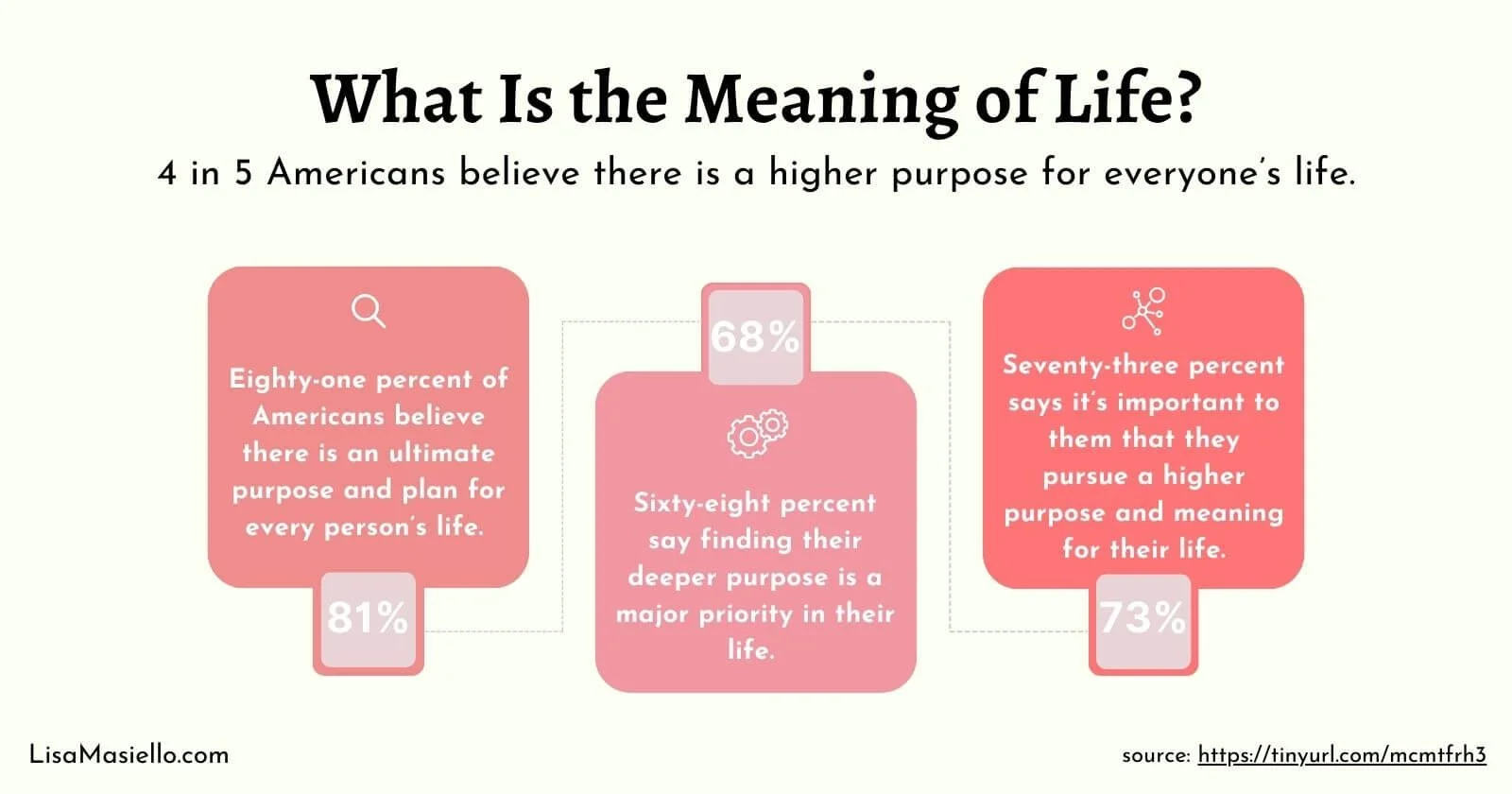Why am I Here? What is My Purpose in Life?
Who am I? Why am I here?
Do you frequently or even infrequently ask these questions? If you do, you’re not alone. Fifty-seven percent of Americans say they wonder how they can find more meaning or purpose in their life at least monthly. Twenty-one percent consider it weekly. Another twenty-one percent say they consider the question daily.

What is my life purpose?
Finding your unique purpose in life can be a profoundly fulfilling experience. Still, it can also be an uncertain and challenging journey. It is an inward-focused journey of self-discovery in which you come to understand why you do what you do, the influences that drive your passions and goals, and the essential values that shape the person you are.
Finding your purpose gives your life deep meaning. It can also boost your well-being and provide a sense of fulfillment, resulting in contentment and calm.
Research published in the Journal of Health Psychology found that a strong sense of purpose is associated with better physical and mental health, including increased physical activity and healthier behaviors.
Victor J. Strecher, author of Life on Purpose, has also explored the connection between people living purposeful lives and heightened levels of resilience, optimism, and long-term happiness, which helps them cope better with stress and life’s difficulties.
In this post, we’ll explore the big questions we all ask about our lives, why it’s so hard to find your purpose in life, and how you can find your purpose.
The big questions of life.
To explore your purpose in life and your place in this world, take time to do some self-analysis. Learning more about yourself by answering these questions will offer a deeper understanding of your values, beliefs, and desires. Answer each of these questions honestly about yourself.
Where did I come from?
You must first know where you came from to understand where you are headed. The answer is not simply about your hometown, ethnicity, and family upbringing but the social, educational, and interpersonal connections that molded you into who you are today.
What influences have impacted your personality and character, how you view the world, and how you treat others? These may be significant life experiences that you’ll never forget or small, almost insignificant moments that live quietly in the deep recesses of your mind. These memories ground you, providing stability and a foundation for exploring your purpose.
Who am I?
If “Where did I come from?” is your foundation or jumping off point on the journey toward finding your purpose, asking, “Who am I?” enables you to get reacquainted with yourself at a deeper level. It requires self-assessment and personal reflection, understanding what motivates, invigorates, and drives you. What are you passionate about? What makes you unique?
Identify your essential personality traits, strengths and weaknesses, natural talents and abilities, passions, morals, and principles. How do they influence and direct your actions and the choices you make?
Honest and thoughtful answers will help steer you in a direction that aligns with your authentic self.
Why am I here?
Over three-quarters of Americans believe there is a supreme plan for every person’s life. But what is it? Why are you here…in this world…at this time? What is your reason for being? What is your mission?
This question is critical because it transcends things like making money or buying a home. It requires you to think deeply about why you were put on this earth, what you are meant to contribute to the world, and how you will leave the world better than you found it.
Think about your passions and what you enjoy doing. How does what you love doing and have a passionate belief in overlap with your natural talents? How can you use these passions and talents to be part of something bigger than yourself?

How do I live life?
This question requires you to think honestly about what type of person you are, how you treat others, and how you live your life. What core principles and values do you live by? Are you a moral, ethical, and honorable person? If you say you are, do your actions match your belief?
Think about the upstanding values that are important to you and how you can live your life to align with these values. This alignment can create a sense of purpose and direction in your life.
Where am I going?
It’s common to get into a rut. So many of us find ourselves doing the same things day in and day out. In a quiet time of reflection, you might say, “What am I doing? Where am I going? The hamster wheel keeps spinning without any change or progress.”
Stop to consider a future for yourself that supports your passions and principles. Visualize your journey, set goals, and take focused steps forward. Making your aspirations a priority, taking purposeful actions, and achieving life’s milestones one step at a time will help guide you in the right direction.

Why is it so hard to find your purpose in life?
Discovering your life purpose can be challenging, complex, and confusing. We incorrectly assume that it is a one-and-done activity. That we find our singular purpose and it becomes our destiny for the rest of our lives. Like ocean waves, societal pressures; personal and professional distractions; indecision; and self-doubt crash against us at times, throwing us off course and knocking us down. Understanding and accepting this ebb and flow helps eliminate some of the pressure that we often place on ourselves or others place upon us.
Societal pressures. Distractions.
From the day we are born, society imposes certain expectations on us. We're expected to have specific values, conform to cultural and socio-economic norms, and follow a predetermined life path that may not align with our authentic selves. The constant pressure from social media and other external distractions to fit into society's mold can make it challenging to discover our purpose. These societal pressures are real and can be overwhelming, but acknowledging them is the first step towards overcoming them.
Fear of failure. Self-doubt.
We are often afraid to follow our true passions for fear of what others might think, as well as the humiliation and rejection that can come with failure if what we try isn't a resounding success. Fear of failure and self-doubt prevent us from taking chances, gambling on the unknown, and stepping out of our comfort zone. Building belief in yourself, seeking support from family and friends, and breaking big dreams into small individual tasks help move you closer to your ultimate goal.
Singular purpose.
As I mentioned, we often incorrectly assume that discovering our life's purpose is a singular activity with a singular outcome and path from which you will never deviate for the rest of your life. This false assumption can create unnecessary pressures and make you miserable.
Remember, your journey is not a straight line. It's multi-phased and filled with detours. Your purpose as a young student may lead you in one direction. Still, the experiences you gather as a middle-aged professional and parent may inspire you to use your expertise in a new way. Understanding and embracing the dynamic nature of this journey can free you from the pressure of a singular purpose and make the journey more exciting and fulfilling.
How do I find my purpose in life?
Challenging yourself by answering the following questions can reveal central themes and sources of inspiration that direct you to your life purpose.
Take handwritten or electronic notes as you consider each question. These notes will enable you to reassess your answers at a later time. You will be better able to evaluate your answers objectively and discover noticeable patterns.
How do you answer these 9 questions:
What are my core values?
Core values are fundamental principles and beliefs by which you live your life. They are the core of who you are and the daily standards you try to live by.
Core values examplesIntegrity
Accountability
Dependability
Trustworthiness
Commitment
Respect
Loyalty
Empathy
Honesty
Identifying your core values helps you understand what is most important to you. It is a critical element of finding your life’s purpose.
When answering the following eight questions, consider how these core values align with activities you enjoy, social issues you care about, and your natural talents.
What makes me lose track of time?
What activities do you enjoy so much that you become so absorbed in what you’re doing that all sense of time disappears? Maybe you enjoy spending time with children, caring for animals, or helping elderly neighbors. These activities or tasks demonstrate your passion. The things that brings you happiness, contentment, and accomplishment.
What do I like to do?
Like the question, “What makes me lose track of time?” the goal of “What do I like to do?” is to uncover what activities you decide to do in your free time when you could choose to do anything. Do you volunteer at a soup kitchen? Do you enjoy gardening? Do you sing in your church choir? What activities bring you the most enjoyment and inner peace?
What social issues do I care about?
Social issues are topics or themes that affect many people. These can be local, regional, national, or international issues.
Social issues examplesPoverty
Lack of affordable healthcare
Immigration
Crime
Homelessness
Racism
Mental health
Climate change
What causes do you care about in your neighborhood, country, or world? What issue or problem makes you want to improve the lives of other people? What causes you to say, “This is not right, and I need to do something about it.”
What are my natural abilities? Skills? Talents?
Each of us has abilities that we are naturally good at. They come easy to us. We probably also enjoy doing them.
Examples of talentsMusic
Writing
Organizational skills
Making money
Public speaking
What skills and talents do you possess and come naturally to you? Identifying these natural gifts can help you discover your passions and serve as a guide to understanding your purpose.
How do I define success?
Every person’s definition of success is different. There is no universal right or wrong answer. Your answer should be based on your own experiences, what brings you fulfillment, and your goals and aspirations.
Examples of personal successFinancial independence
Graduating from a prestigious university
Becoming fluent in a new language
Raising $50,000 for charity
Starting your own business
To help determine how you define your success, consider what standards you have set for yourself, what you value most, and what you consider a rewarding and meaningful life.
Who inspires me? Why?
Identifying the people who inspire you can give you a better understanding and insight into the values important to you, the things that make your soul happy, the hopes and desires you have for yourself, and the dreams you want to achieve. They can be people you respect, admire, and want to be like. These individuals may be close family members, friends, or teachers. Still, they can also be people you have never met personally, like public figures, corporate CEOs, or government leaders.
What are my dreams? Aspirations?
What are your hopes and dreams? What ambitions, goals, and aspirations do you have for your personal and professional life? Knowing your dreams and aspirations can help shine light on your standards, values, and ultimately, your life’s purpose.
How can I serve others?
Most people share the value of helping others. This can be simple, like offering to pick up groceries for an elderly neighbor, or it can require more time, effort, and money, like traveling across the country to help people rebuild their lives after a hurricane or tornado ravaged their community.
Think about your talents and skills and how you can use these gifts to help others. What issues and causes do you particularly care about? Answering the question, “How can I serve others?” will help you step outside your daily existence and contribute to something larger than yourself.
By taking the time to think deeply about each of these previous questions, answering them honestly, and analyzing your answers, you are taking a powerful step toward uncovering your life’s purpose, which will begin to reveal itself.

Finding your purpose.
Finding your life purpose is a highly personal and transformational effort. You must self-reflect, possess emotional intelligence, and be open to new prospects, opportunities, and potential struggles.
It requires you to ignore the social pressures, distractions, and self-doubt plaguing many of us and live on your terms—being true to yourself. This journey will not be easy, simple, or quick. That’s why it’s a journey. But trust that by following your intuition, aligning your actions with your values, talents, and passions, and embracing the freedom and confidence that comes from living true to yourself, you will have the most rewarding life.
Other related posts